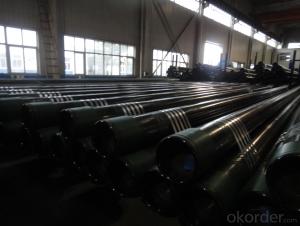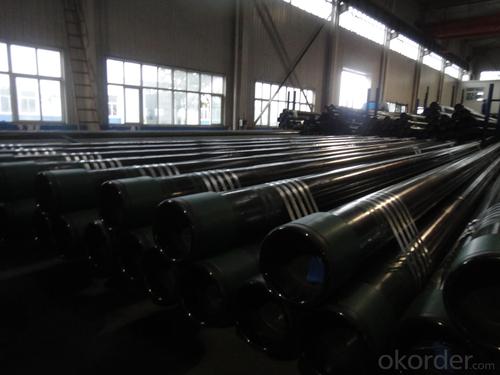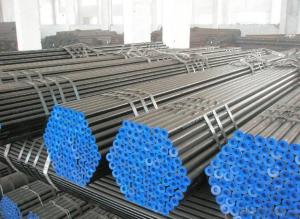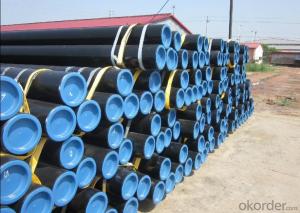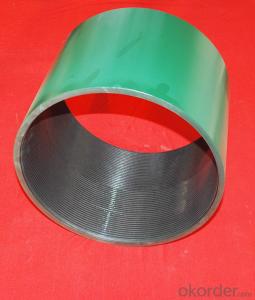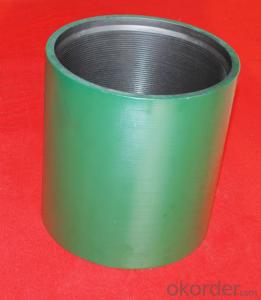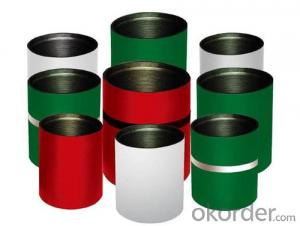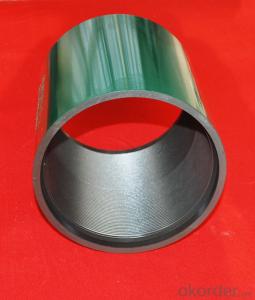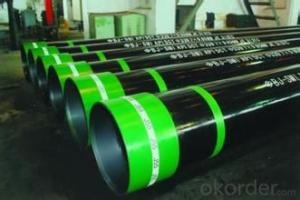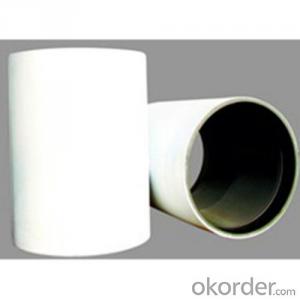13 3/8" 54.5ppf API 5CT casing pipe BTC end
- Loading Port:
- Shanghai
- Payment Terms:
- TT OR LC
- Min Order Qty:
- 10 m.t.
- Supply Capability:
- 100000 m.t./month
OKorder Service Pledge
OKorder Financial Service
You Might Also Like
Detailed Product Description
1.API casing pipe
2.K55 or J55 or others
3.API standard
4.STC thread or others
5. Any OD and wall thickness you need.
Casing Technical Specification (Standard API Spec 5 CT) | |||||||
Size | Outside Diameter | Inside Diameter | Grade | Wall Thickness | |||
in | mm | in | mm | in | mm | ||
4-1/2 | 4.500 | 114.30 | 4.000 | 101.60 | J55K55N80 | 0.250 | 6.35 |
3.920 | 99.57 | J55K55N80 | 0.290 | 7.37 | |||
5 | 5.000 | 127.00 | 4.408 | 111.96 | J55K55N80 | 0.296 | 7.52 |
4.276 | 108.61 | N80P110 | 0.362 | 9.29 | |||
4.126 | 104.80 | N80P110 | 0.437 | 11.10 | |||
5-1/2 | 5.500 | 139.70 | 4.892 | 124.26 | J55K55N80 | 0.304 | 7.72 |
4.778 | 121.36 | N80 | 0.361 | 9.17 | |||
4.670 | 118.62 | N80 | 0.415 | 10.54 | |||
7 | 7.000 | 177.80 | 6.366 | 161.70 | J55K55N80 | 0.317 | 8.05 |
6.276 | 159.41 | J55K55N80 | 0.362 | 9.19 | |||
6.184 | 157.07 | N80 | 0.408 | 10.36 | |||
9-5/8 | 9.625 | 244.48 | 8.755 | 222.38 | N80 | 0.435 | 11.05 |
8.681 | 222.50 | N80 | 0.472 | 11.99 | |||
10-3/4 | 10.750 | 273.05 | 10.050 | 255.27 | H40J55K55N80 | 0.350 | 8.89 |
9.850 | 250.19 | J55K55N80 | 0.450 | 11.43 | |||
13-3/8 | 13.375 | 339.72 | 12.615 | 320.42 | J55K55 | 0.380 | 9.65 |
12.415 | 315.34 | J55K55N80 | 0.480 | 12 | |||
- Q: Can steel pipes be used for the construction of offshore platforms?
- Yes, steel pipes can be used for the construction of offshore platforms. Steel pipes are commonly used in offshore platform construction due to their high strength, durability, and resistance to corrosion. These pipes can be used for various purposes such as structural support, transporting fluids, and as conduits for electrical and communication systems. Additionally, steel pipes can be easily fabricated, installed, and maintained, making them a reliable choice for offshore platform construction.
- Q: What is the average lifespan of a steel pipe?
- The average lifespan of a steel pipe can vary depending on various factors such as the quality of the steel, the environment it is exposed to, and the maintenance practices followed. However, on average, a well-maintained steel pipe can last anywhere between 20 to 100 years.
- Q: What's the difference between round and round tubes?
- Round steel is a medium solid steel, of course the tube is hollow
- Q: Can steel pipes be used for conveying steam?
- Yes, steel pipes can be used for conveying steam. Steel pipes are commonly used in steam systems due to their high strength and durability, as well as their ability to withstand high temperature and pressure conditions. However, it is important to ensure that the steel pipes are properly insulated and the system is adequately designed to prevent any potential issues such as corrosion or thermal expansion.
- Q: What is the difference between seamless steel pipes and seamless stainless steel pipes?
- The main difference between seamless steel pipes and seamless stainless steel pipes lies in their composition. Seamless steel pipes are typically made from carbon steel, which is an alloy of iron and carbon. On the other hand, seamless stainless steel pipes are made from an alloy of iron, carbon, and chromium, which gives them enhanced corrosion resistance and durability. This makes seamless stainless steel pipes suitable for applications where resistance to corrosion is essential, such as in the food industry or in environments with high humidity or exposure to chemicals.
- Q: Can steel pipes be used in extreme weather conditions?
- Yes, steel pipes can be used in extreme weather conditions. Steel is known for its high strength and durability, making it suitable for a wide range of applications including construction, infrastructure, and transportation. Steel pipes are commonly used to transport fluids and gases in various industries, and they are designed to withstand harsh environmental conditions, including extreme temperatures, high pressures, and corrosive environments. In extreme weather conditions such as extreme heat, cold, or heavy rain, steel pipes can maintain their structural integrity and functionality. Additionally, steel pipes can be coated or insulated to provide additional protection against corrosion and to maintain desired temperatures. Overall, steel pipes are a reliable choice for use in extreme weather conditions due to their strength, durability, and resistance to various environmental factors.
- Q: What are the different methods of inspecting steel pipes?
- There are several methods of inspecting steel pipes, including visual inspection, ultrasonic testing, magnetic particle testing, dye penetrant testing, radiographic testing, and eddy current testing.
- Q: Theoretical weight of 25*25*1.5 square steel tubes
- The theoretical weight of 25*25*1.5 square steel tubes is 1.075kg/m.
- Q: Can steel pipes handle extreme weather conditions?
- Yes, steel pipes are known for their durability and ability to withstand extreme weather conditions. They are resistant to corrosion, rust, and can handle high temperatures, making them suitable for various climate conditions.
- Q: How are steel pipes used in heating systems?
- Steel pipes are commonly used in heating systems to transport hot water or steam from the boiler to the radiators or heating units. The durability and strength of steel make it an ideal choice for withstanding high temperatures and pressure. These pipes are typically installed underground or within the walls and floors of buildings to distribute heat efficiently throughout the space.
Send your message to us
13 3/8" 54.5ppf API 5CT casing pipe BTC end
- Loading Port:
- Shanghai
- Payment Terms:
- TT OR LC
- Min Order Qty:
- 10 m.t.
- Supply Capability:
- 100000 m.t./month
OKorder Service Pledge
OKorder Financial Service
Similar products
Hot products
Hot Searches
Related keywords
